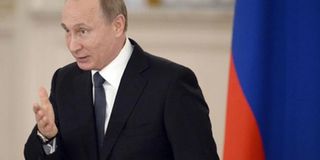US accused of seeking Russia regime change

Russian President Vladimir Putin at the Kremlin in Moscow on May 19, 2015. PHOTO | ALEXANDER NEMENOV |
What you need to know:
- Country has revised its military doctrine.
- Tension over move by Moscow to boost presence in Arctic to protect interests.
MOSCOW
Hoping to get its hands on the entire Arctic, Washington wants to bring regime change in Russia, says Mr Bruce Gagnon, a coordinator from Global Network against Weapons & Nuclear Power in Space, Press TV reported.
Russia has the world’s largest supply of natural gas.
With the melting of the ice around the Arctic due to climate change, Russia will have a massive land border with the oil-and-gas rich Arctic Sea.
Western corporations want to get their hands on these resources and that is the reason why Washington plans to bring chaos inside of Russia, Mr Gagnon said.
“They hope to be able to create chaos inside… and having regime change in Moscow. That’s the bottom line. That’s the goal that the United States wants to produce.”
The Arctic Ocean is extremely rich in natural resources, especially oil and gas. According to estimates, the bottom of the Arctic Ocean has large deposits of oil and gas, including 15 per cent of the world’s oil reserves and 30 per cent of natural gas reserves, Press TV reported.
In 2014, Moscow decided to boost Russia’s military presence in the Arctic. The country’s revised military doctrine emphasizes the protection of national interests in the oil-and-gas rich Arctic regions.
Meanwhile, Russian President Vladimir Putin officially enacted a law banning “undesirable” non-governmental organisations, the Kremlin said on Saturday, in a move condemned by human rights groups across the board.
The law allows authorities to bar foreign civil society groups seen as threatening Russia’s “defence capabilities” or “constitutional foundations” and go after local activists working with them, the Kremlin statement said. Supporters presented the law as a “preventative measure”, necessary after the wave of Western sanctions put in place over the Ukraine conflict.
Under the law, passed by the Russian parliament this week, authorities can ban foreign NGOs and go after their employees, who risk up to six years in prison or being barred from the country.
It also allows them to block the bank accounts of the organisations until the NGOs “account for their actions” to the Russian authorities.
Lawmakers cited the need to stop “destructive organisations” working in Russia, which could threaten the “value of the Russian state” and stir up “colour revolutions”, the name given to pro-Western movements seen in some former Soviet republics over the last several years.
Critics have said that the vague wording of the law — which gives Russia’s general prosecutor the right to impose the “undesirable” tag without going to court — could allow officials to target foreign businesses working in Russia.
(AFP, Agencies)





